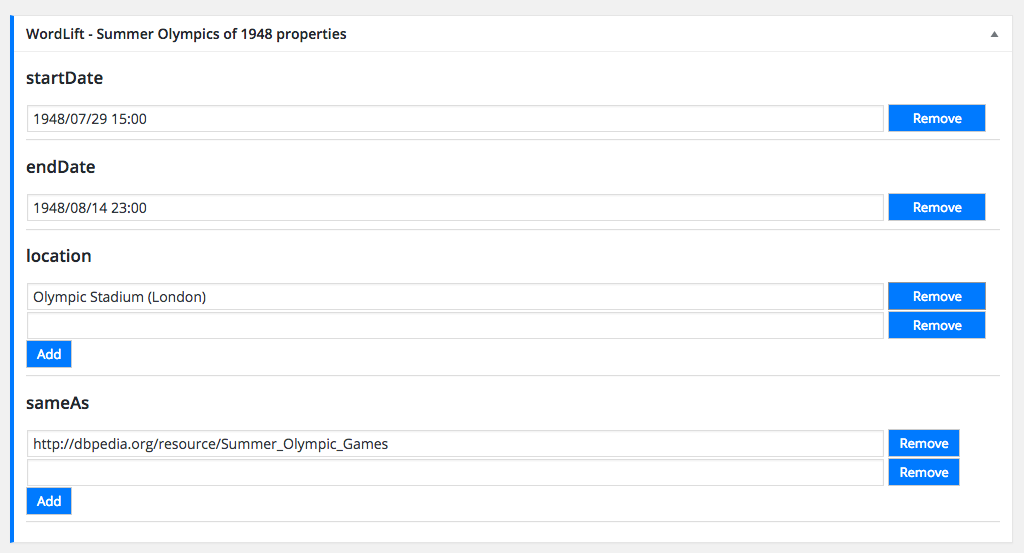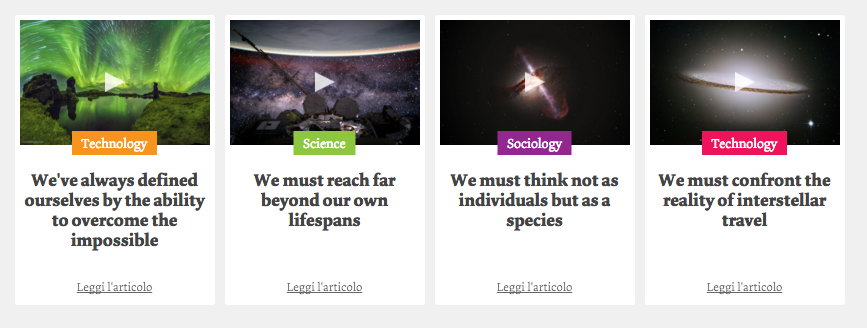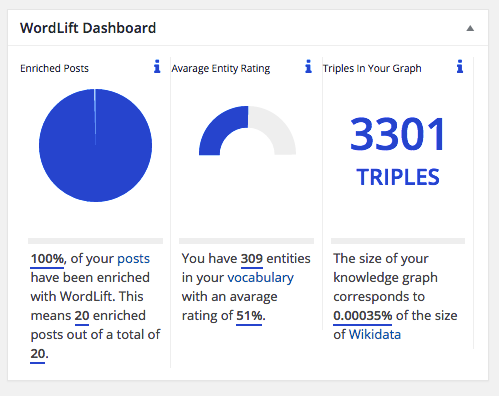
WordLift – AI powered SEO – Schema Plugin
Search engines are looking for meaning, not keywords. WordLift tells Google how your content relates to your brand, products, and stakeholders.
WordLift – AI-Powered SEO – Schema
WordLift connects to your existing website, reads your content, finds entities in it (like places and people), and creates a representation of your content search engines will love.
WordLift, without requiring any technical skills, creates code (called Structured Data or Schema markup) that reiterates your page’s content in a manner that search engines best understand.
WordLift is available to try free for 14 days. Find out more and get your activation key directly on our website.
All our clients enjoy an increase in organic traffic. A lot of them start seeing rich snippets in their Google results pages. Some also experience an increase in website authority. All of them can delegate complex SEO tasks to junior staff.
This lift is made possible by our Artificial Intelligence engine working behind the scenes understanding, highlighting, and connecting your content.
WordLift lets you create, own and publish your own knowledge graph.
WordLift publishes your content as Linked Open Data following Tim Berners-Lee‘s Linked Data Principles.
Features
WordLift is a plug-in for online content creators to:
- Support your writing process with trustworthy and contextual facts
- Enrich content with images, links and interactive visualizations
- Keep readers engaged with relevant content recommendations
- Produce content compatible with schema.org markup, allowing search engines to best index and display your website.
- Engage readers with relevant content recommendations
- Publish metadata to share, sell and distribute content
WordLift brings to your publishing workflow
- The technology to self-organize content using publicly or privately available knowledge graphs
- An easy way to build datasets and full data ownership
- Support for creating web content using contextually relevant information
- Valued and free to use photos and illustrations from the Commons community ranging from maps to astronomical imagery to photographs, artworks and more
- New means to drive business growth with meaningful content discovery paths
- Content tagging for better SEO
Supported languages
WordLift currently supports 32 languages: Chinese, Danish, German, English, French, Italian, Dutch, Russian, Spanish, Portuguese, Swedish, Turkish, Albanian, Belarusian, Bulgarian, Catalan, Croatian, Czech, Estonian, Finnish, Hungarian, Icelandic, Indonesian, Latvian, Lithuanian, Norwegian, Polish, Romanian, Serbian, Slovak, Slovenian, Ukrainian.
We also experimentally support hundreds of languages with many different alphabets. You can use WordLift in any language that is being supported natively by WikiData.
The Plug-in is built on open source software.
More Information
WordLift is happily developed by WordLift, an innovative Italian startup founded in 2017 and based in downtown Rome.
WordLift helps companies, operating in all market sectors, including e-commerce, of the small, medium, and large sizes to speak Google’s native language by converting unstructured content into structured data that search engines understand. This will allow them to get more organic traffic to the website and offer a more relevant user experience.
For more information, contact us at hello@wordlift.io.
Why we are doing this
Our mission is an utopian one: organize the world general knowledge by providing tools that everyone can use.
In open source we trust
WordLift is built on open source software.
WordLift uses open source tools for natural language and semantic processing.
In data ownership we trust
We believe content creators should own, retain and exploit the value of the metadata they create.
Get involved with the Development
If you are a coder and wish to contribute to WordLift plugin you are welcome to get involved via Github.
WordLift Plugin Repo:
https://github.com/insideout10/wordlift-plugin
WordLift Plugin Issue Tracker:
https://github.com/insideout10/wordlift-plugin/issues
Installation
- Upload
wordlift.zipto the/wp-content/plugins/directory - Extract the files in the wordlift subfolder
- Activate the plug-in using a WordLift key. You receive this key from us after purchasing the monthly service from our website. Once you have received the key go to the WordPress administration menu, click on Plugins / Installed Plugins. Then click on Settings on the WordLift plugin and follow the guided setup process.
WordLift – Activating the Plugin
To activate the plugin you will need a WordLift key.
WordLift is now available to all for a monthly fee.
Find out more and get your activation key directly on our website.
Screenshots

The Setup Wizard.

The slick WordLift Edit Post Widget.

The WordLift Edit Post Widget explained.

The WordLift Event Entity.

The WordLift Place Entity.

The Navigator Widget providing content-recommendations.


The Chord Widget.

The WordLift Dashboard. Your knowledge graph at a glance.
FAQ
Find here the Frequently Asked Questions. Also look into our docs:
http://docs.wordlift.io/
WordLift helps small, medium, and large businesses in all market segments, including e-commerce, speak Google’s language by transforming unstructured content into structured data that search engines can understand.
WordLift democratizes the field, bringing to the hands of all web content creators the technology that web publisher giants such as Google, Facebook and the BBC are using to organize and monetize their content.
WordLift helps you create richer and more engaging content, optimizes it for all search engines and efficiently organizes your content creation process, allowing you to reach and speak directly to your tribe.
Organizing web content around an internal vocabulary rather than traditional web pages helps both users and machines finding and accessing it, improving navigation, content re-use, content repurposing, and search engine rankings.
WordLiftorganizes content, reducing the complexity of content management and content marketing operations, letting bloggers and site owners focus on stories and communities.
WordLiftenriches your content with contextual information, links, and media, from custom vocabularies and/or the wealth of open data available on the web, bringing your user experience to a new level of engagement.
WordLiftconnects content with cross-media discovery and recommendations widgets, increasing content quality, exposure, trustworthiness and readership engagement.
WordLiftoptimizes content, complementing the offer of plug-ins such as SEO Ultimate or Yoast, automatically adding schema.org markups to your text, allowing all search engines to properly index your pages and deliver more traffic to your site.
We are on a mission to improve the visibility of websites. Testing the product’s assumptions by looking at the web metrics with a methodical approach, is a crucial part of our product development.
We recently presented a research study and proved that our semantic markup, annotations and widgets improve the number of visitors, the pageviews, the time spent on page and the duration of a session with a double digit growth on an editorial website with around 150.000 monthly visitors.
While not all websites are created equal, you can download the result of this study and start testing WordLift yourself. It does work!
To know more about how WordLift works, please watch the step-by-step video tutorials on our website.
WordLift works in subsequent stages.
The first step provides a full text analysis and suggests concepts and relationships found in open vocabularies (such as DBpedia, Wikidata, GeoNames, etc) to help writers classify and enrich their content and structure it for search engines like Google, according to schema.org vocabulary.
Writers can then create new entities, to complement the ones suggested automatically, and to be published as part of a proprietary vocabulary, acting both as a reference and a search magnet for their readers, according to the editorial plans.
WordLift also assists writers suggesting links, media and providing a set of powerful visualization widgets to connect and recommend alternative content, to boost readers’ engagement.
Finally WordLift provides means to record all these relationships in a graph database allowing search queries like “find all contents related to concept_y and relevant for target_z”.
WordLift currently supports 32 languages: Chinese, Danish, German, English, French, Italian, Dutch, Russian, Spanish, Portuguese, Swedish, Turkish, Albanian, Belarusian, Bulgarian, Catalan, Croatian, Czech, Estonian, Finnish, Hungarian, Icelandic, Indonesian, Latvian, Lithuanian, Norwegian, Polish, Romanian, Serbian, Slovak, Slovenian, Ukrainian. We also now experimentally supporthundreds of languages with many different alphabets.
Yes! All of our subscriptions come with a 14-day free trial. If after two weeks you are not happy with WordLift, contact us and we will cancel your subscription, no questions asked.
You do! We believe content creators should retain the commercial value of their content and all the data they create and exploit it through new business models based on content syndication, data-as-a-service and a stronger relationship with their audience.
You can open your datasets to the public, attaching to it a free or a commercial licence. Otherwise, use your data to feed chat bots on Facebook Messenger or Telegram, providing live feed updates on your activity and/or automatic customer service in real time.
If you stop paying for your subscription, but keep the plugin on your site, all the entities, metadata and pages you created with wordlift will still be available on your site – you won’t be able to update it any longer, but they will still work just fine as they were at the moment you removed the key. The data you’ve created belongs to you and you can always request to us a data dump that is available in various machine-readable formats.
if you deactivate the plugin instead, the vocabulary (metadata, entity and pages) will disappear from your dashboard, but everything you created is stored in your website Database in WordPress, and you will be able to download it, transfer it or re-activate it again anytime from the plugin menu.
Turning off WordLift on our side, it would be like turning off all the keys and un-publish all the linked data you’ve created, not the plug-in itself, so it will be like #1 – you could get the data back from us and re-publish it as linked data on your own infrastructure.
WordLift’s technology is entirely open source: it takes development skills, infrastructure and some wisdom to nicely bring all the pieces together without our support.
Your vocabulary (article metadata and entities) are published as linked data and you can always request a data dump in any of the following formats: RDF/XML, Turtle, N3, JSON-LD.
Find more FAQ in our Wiki.
Changelog
3.52.8 (2024-06-11)
- Fix #1737: Fixed garbled text after Block Editor reported the wrong text length in combination with some themes
3.52.7 (2024-03-27)
- Update wp-background-processing.php
- Fix Article Wrapper using the entity properties
3.52.6 (2024-03-17)
- Remove deprecation warnings
- Fix an issue with reading the include/exclude default setting
3.52.5 (2024-03-13)
- Remove unneeded warnings when trying to process a var which is not an array in Free Shipping Method
- Check if
urlsexists before trying to access its data in Include Exclude URL
3.52.4 (2024-02-15)
- Ensure we don’t publish an empty author.
3.52.3 (2024-01-17)
- Remove some warnings ⚠️ when trying to access an array key that doesn’t exist.
3.52.2 (2024-01-09)
- Include/Exclude now applies to REST API as well ⚙️
3.52.1 (2024-01-07)
- Uh oh, sometimes we would send a
false🪳 in the Structured Data. Fixed!
3.52.0 (2024-01-04)
- The new year brought 👩💻🧑💻👨💻 Co-Authors Plus support, if you use it, we’ll publish the whole list of authors to Structured Data.
3.51.4 (2023-12-07)
- Squashes a little bug 🪳 when reading the sameAs URLs.
3.51.3 (2023-11-29)
- For complicated WordPress installs 😅, like when there’s a WordPress backend and a headless frontend, now it is possible to override the production URL.
3.51.2 (2023-11-19)
- 🍜 Added support for WPRM 9.
3.51.1 (2023-10-24)
- 🪳 Bug fix: manual ingredients matches were overwritten by automatic sync #1712.
3.51.0 (2023-10-23)
- 📣 New feature announcement: opt in to provide plugin diagnostics for a better and faster support #1711.
3.50.0 (2023-09-20)
- New Dashboard improvements.
3.49.2 (2023-09-19)
- Events are sending IDs instead of URLs, squashed 💪
- Added WPRM 8.10 compatibility.
3.49.1 (2023-08-16)
- Limit the increase of words in the structured data description property only to Products.
3.49.0 (2023-08-13)
- Increase the words in the structured data description property.
- Improve the API experience.
- Fix KPI events reporting.
3.48.3 (2023-08-07)
Some captions have been fixed.
3.48.2 (2023-08-05)
We fixed some pagination issues in the terms and ingredients screen.
3.48.1 (2023-08-04)
Some more polishing of the Dashboard.
3.48.0 (2023-08-01)
We have a great way to track KPIs, if you’d like to opt-in reach us at hello@wordlift.io with the subject “KPI Events”.
3.47.0 (2023-07-16)
A new improved dashboard for our whitelabel customers.
3.46.0 (2023-07-04)
We’re testing a new onboarding flow to make things easier 💫
3.45.3 (2023-07-02)
- Fix #1699: Refactor layout for WP 6.2.2 compatibility to squash a WP 6.2.2 incompatibility.
3.45.2 (2023-06-27)
- Fix #1697: We now officially support WP Recipe Maker 8.9.2
3.45.1 (2023-05-31)
- Fix: we squashed some errors due to an old meta field.
3.45.0 (2023-05-25)
- Enhancement #1675: We super power Yoast structured data markup with upscaled images.
3.44.8 (2023-05-25)
- Fix #1693: Uncaught Error: Object of class WP_Post could not be converted to string.
3.44.7 (2023-05-25)
- Fix #1691: Fix issues with dashboard screens.
3.44.6 (2023-05-22)
- Fix #1690: Check that we found a Content before attempting to use it.
3.44.5 (2023-05-22)
- Fix: an empty publisher raises an error.
3.44.4 (2023-05-16)
- Fix #1688: Fix Issues with dashboard.
3.44.3 (2023-05-11)
- Fix Dashboard App.
3.44.2 (2023-05-11)
- Fix #1685: Fix wl_post_jsonld_array raising error on class-post-jsonld.php.
3.44.1 (2023-05-09)
- Fix #1685: WPRM 8.8 is out and WordLift supports it.
3.44.0 (2023-05-08)
- Fix #1678: WordLift can now supercharge your images by upscaling them (and reducing their size at the same time), AI powered.
3.43.1 (2023-05-04)
- Fix #1681: Fix issues with reference infos in jsonld.
3.43.0 (2023-05-03)
- Fix #1677: References aren’t correctly handled causing mentions not to be populated.